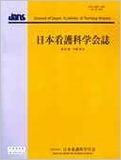Japanese
English
- 販売していません
- Abstract 文献概要
- 参考文献 Reference
- サイト内被引用 Cited by
要旨
目的:2型糖尿病を有する高齢者に教育的支援を行う場面で,外来看護師は教育の方向性をどのように決定するのか明らかにする.
方法:2型糖尿病を有する高齢者へ教育的支援を行った経験をもつ外来看護師6名に半構造的面接を行い,収集したデータを,グラウンデッド・セオリー・アプローチを用いて分析した.
結果:12の概念で構成される【療養スタイルの変化の可能性の評価】という現象が明らかになった.看護師が【療養スタイルの変化の可能性を評価】することで,《変化に向けた教育》,《現状維持という方向性》,《方針の見直し》という3つの異なる方向性に至っていた.
結論:【療養スタイルの変化の可能性の評価】は個々に適した教育の方向性を導くと同時に高齢者の安全を確保するために必要である.一概に変化を目指すのではなく,療養の方向性の検討,目標の共有,意欲の確認を行って《現状維持という方向性》への転換を検討する必要がある.
Purpose: This study identified how outpatient nurses determine the aim of educational support for the elderly with type 2 diabetes mellitus.
Methods: The participants in this study were six outpatient nurses who provided educational support to the elderly with type 2 diabetes mellitus. We conducted semi-structured interviews and analyzed the interview data using the grounded theory approach.
Results: The phenomenon of [Evaluation of the Potentiality to Change Self-Care Patterns] which consisted of 12 categories, was identified. The aim of educational support varied according to nurses' [Evaluation of the Potentiality to Change Self-Care Patterns]. This phenomenon consisted of several processes that led to three different consequences: «Education Aimed at Change», «Directionality of Maintaining the Status Quo», and «Reconsidering the Treatment Plan».
Conclusion: [Evaluation of the Potentiality to Change Self-Care Patterns] is necessary to guide the delivery of individual educational support and to ensure safety for elderly people. It cannot be necessarily said that «Education Aimed at Change» is appropriate for all patients. Therefore, it is necessary that nurses consider switching to «Directionality of Maintaining the Status Quo» by considering the goal of self-care, goal sharing, and evaluating the motivation of each patient.
Copyright © 2017, Japan Academy of Nursing Science. All rights reserved.


